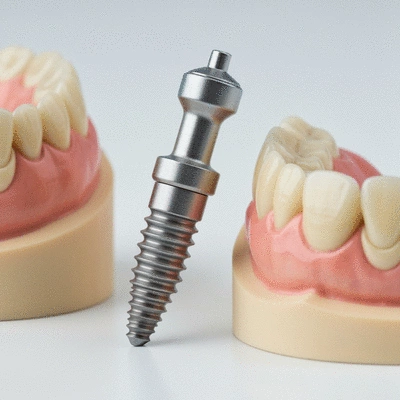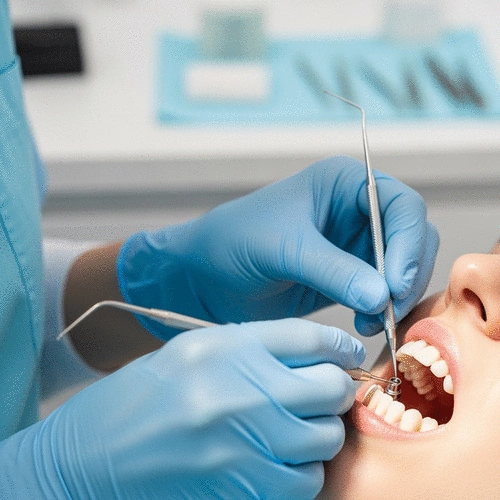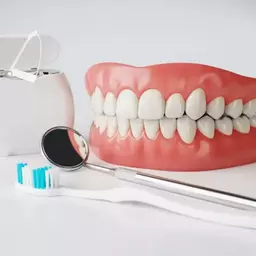When considering a dental implant, it's essential to understand how this transformative procedure can enhance both your smile and your confidence. Beyond the aesthetic appeal, dental implants play a significant role in your overall oral health. Are you ready to discover the key insights that will guide you through this journey?
What You Will Learn
- Dental implants are durable, closely mimicking the appearance and functionality of natural teeth.
- Choosing between titanium and zirconia implants depends on individual needs and aesthetic preferences.
- A thorough initial consultation is crucial for assessing suitability and creating a personalized treatment plan.
- Understanding the financial implications of dental implants can help you budget effectively for your dental health investment.
Dental Implant Procedure Overview and Success Factors
This visual summarizes key aspects of dental implants, including assessment, types, success rates, and financial considerations. It highlights critical information to help patients make informed decisions.
Dental Implant Benefits
- ✓ Natural Appearance
- ✓ High Durability
- ✓ Prevents Bone Loss
- ✓ Improved Functionality
Material Types
Key Assessment Steps
- • Medical History Review
- • Oral Health Exam
- • X-rays & Imaging
- • Treatment Plan
High Success Rates (>95%)
Cost Breakdown (Per Implant)
- Consultation: $100-300
- Placement: $1,500-3,000
- Crown: $1,000-3,000
- Add. Proc.: $300-2,000
Understanding the Dental Implant Procedure: A Comprehensive Overview
When it comes to improving your smile, dental implants can be a game changer. But what exactly is a dental implant? It’s a small titanium post that is surgically placed into your jawbone, serving as a replacement root for a missing tooth. If you're considering restoring your smile, implants are a popular choice because they closely mimic the look and feel of natural teeth!
Many patients at Best Dentists ask about the benefits of dental implants. They’re durable, offer a seamless aesthetic, and can significantly enhance your confidence. Imagine enjoying your favorite foods without worrying about your teeth. For more insights on choosing the right restorative options, consider exploring Choosing Your Restorative Dental Options. That’s the freedom that implants can bring!
What is a Dental Implant and Why Consider One?
- Natural Appearance: Dental implants look and feel like your natural teeth.
- Durability: They are designed to last many years, often a lifetime with proper care.
- Bone Health: Implants help prevent bone loss that occurs with missing teeth.
- Improved Functionality: Enjoy the ability to eat, speak, and smile confidently.
Choosing a dental implant means investing in your oral health. Not only do they improve the overall appearance of your smile, but they also help maintain the structure of your jawbone. This makes them an excellent long-term solution for tooth loss.
How Dental Implants Transform Your Smile and Confidence
Have you ever felt self-conscious about your smile? Dental implants can change that! They offer a permanent solution for missing or damaged teeth, restoring both functionality and aesthetics. Beyond just looks, they can significantly enhance your confidence, allowing you to engage more freely in social settings.

Many of my patients at Best Dentists share their newfound enthusiasm after getting implants. Imagine walking into a room and feeling proud to smile! Whether you're at a family gathering or a professional event, you’ll feel more at ease.
Exploring Different Types of Dental Implants: Titanium vs. Zirconia
When deciding on dental implants, you’ll encounter different materials, primarily titanium and zirconia. Titanium implants are the most commonly used due to their strength and biocompatibility. They fuse well with the jawbone, providing a stable foundation.
On the other hand, zirconia implants offer a metal-free option, which some patients prefer for aesthetic reasons. They can also be a great choice for those with metal sensitivities. Both types have their advantages, and I’m here to help you choose the one that fits your needs best.
Initial Consultation and Assessment: Setting the Stage for Success
Your journey to a new smile begins with an initial consultation at Best Dentists. This is a crucial step where we assess your dental health and discuss your goals. Knowing what to expect can help ease any anxieties you may have.
During this visit, we’ll review your medical history, take necessary X-rays, and perform a thorough examination to determine if you’re a suitable candidate for dental implants. Together, we will create a tailored treatment plan that aligns with your unique situation!
What to Expect During Your First Visit
- Discussion of your dental goals and treatment history.
- Comprehensive examination of your oral health.
- X-rays to evaluate bone density and structure.
- Answering any questions you may have about the procedure.
It's an informative session aimed at making sure you feel comfortable and informed about the process ahead. At Best Dentists, we believe in fostering trust and encouraging open communication about your dental care! For more information on maintaining good oral health, check out our guide on Oral Health and Overall Wellness.
Medical History and Suitability Evaluation
During your consultation, we focus on your medical history to ensure that dental implants are a safe option for you. Factors such as existing health conditions, medications, and lifestyle choices play a vital role in determining your suitability.
By gathering this information, we can tailor your treatment plan to fit your needs, ensuring the best possible outcome. Remember, your safety and satisfaction are our top priorities!
X-rays and Imaging: Understanding Your Jawbone Density
X-rays and imaging are essential tools in the assessment process. They provide a clear view of your jawbone structure, helping us to evaluate whether there’s enough bone present to support an implant. If not, we may discuss options like bone grafting.
Understanding your jawbone density is crucial in planning the placement of your dental implants effectively!
Importance of a Comprehensive Evaluation in Treatment Planning
A comprehensive evaluation ensures that we take all aspects of your dental health into account. This thorough approach helps us identify any potential issues beforehand and plan accordingly, making the entire implant process smoother.
At Best Dentists, we aim for a seamless experience from the very first visit, guiding you every step of the way towards achieving a radiant smile!
We Want to Hear From You!
Have you or someone you know considered getting dental implants? What are your main concerns or questions about the process? Share your thoughts below:
Addressing Common Concerns and Questions About Dental Implants
When considering dental implants, it's perfectly normal to have questions and concerns. After all, this is a significant decision regarding your oral health! In this section, I’ll address some of the most common queries I receive from my patients at Best Dentists, helping you feel more confident and informed about what to expect.
Understanding Risks and Pain Levels
Every surgical procedure comes with certain risks, and dental implants are no exception. However, the benefits often outweigh the potential downsides. Most patients report feeling minimal discomfort during the procedure itself, thanks to effective anesthesia and sedation options. Here’s a quick rundown of what you might encounter:
- Pain Levels: Expect some soreness following the procedure; however, most find it manageable with over-the-counter pain relievers.
- Potential Risks: Infection, nerve damage, and implant failure are rare but can occur without proper care.
- Long-term Considerations: Continuing oral hygiene and regular dental visits are crucial to mitigate any future complications.
Understanding these factors can help ease your mind and prepare you for your journey. If you have further concerns, don’t hesitate to ask me during your consultation!
Exploring Alternatives to Dental Implants
While dental implants are a fantastic option for many, there are alternatives worth considering based on individual needs. Here are a few options that might suit your situation:
- Dental Bridges: These are ideal for replacing a few missing teeth without surgery.
- Partial Dentures: A removable option that can restore function and aesthetics.
- Complete Dentures: Suitable for those who have lost all their teeth; advancements in materials have made them more comfortable than ever.

Exploring these alternatives can help you make a more informed decision! Remember, each option has its pros and cons, so we’ll work together to find what best fits your lifestyle and needs.
Evaluating Implant Success Rates: What Studies Show
Success rates for dental implants are impressively high, often exceeding 95%. According to recent studies, factors such as a patient's overall health, bone density, and oral hygiene practices can influence these rates. Here are some key points to consider:
- Health Factors: Non-smokers and individuals with good oral health typically see better success rates.
- Bone Density: Adequate jawbone structure is crucial for stability; if it's lacking, procedures like bone grafting can enhance outcomes.
- Long-Term Care: Regular follow-ups and proper maintenance play a significant role in ensuring the longevity of your implants.
As your dental partner, I’m here to guide you through the process and discuss success rates specific to your situation. Let’s make sure you have a solid plan for a successful implant journey!
Financial Considerations: Budgeting for Your Dental Implant Journey
Understanding the financial aspect of dental implants is essential, as it can sometimes be a deterrent for patients looking to restore their smiles. Let's break down the costs and options you have at your disposal.
Cost Breakdown: What to Expect Financially
The total cost of dental implants can vary widely based on several factors, including the complexity of the case and the materials used. Here’s a typical breakdown to give you an idea:
- Consultation Fees: The initial examination and x-rays can range from $100 to $300.
- Implant Placement: The procedure itself typically costs between $1,500 and $3,000 per implant.
- Additional Procedures: Bone grafting or sinus lifts, if necessary, can add $300 to $2,000 to your total.
- Crown Cost: The dental crown placed on the implant usually ranges from $1,000 to $3,000.
While these costs may seem daunting, remember that investing in your oral health can lead to long-term benefits, including improved function and a boost in self-confidence. For more details on budgeting and understanding the overall expenses, explore our article on Understanding Oral Health Care Costs.
Insurance Coverage: Navigating Financial Assistance
Many patients wonder about their insurance options when it comes to dental implants. Here are some things to keep in mind:
- Insurance Policies: Some plans may cover part of the costs associated with dental implants, particularly if they are deemed medically necessary.
- Flexible Spending Accounts (FSAs): Utilizing these can help manage out-of-pocket expenses effectively.
- Payment Plans: Many dental offices, including Best Dentists, offer financing options to help spread out the costs over time.
As part of our commitment to your care, we will work with you to explore all possible financial avenues to make your implant journey more affordable!
Factors That Affect the Cost of Dental Implants
It's essential to recognize that several factors can influence the overall cost of your dental implants. Here are a few key considerations:
- Location: Costs can vary depending on the geographical area; urban centers may have higher rates.
- Material Quality: Titanium and zirconia implants may differ in price.
- Complexity of Treatment: Additional procedures may be necessary for optimal results, which can impact the cost.
By understanding these factors, you can better prepare for your dental implant journey and make an informed decision. Together, we can design a treatment plan that aligns with your needs and budget!
Frequently Asked Questions About Dental Implants
- Q: What are dental implants?
- A: Dental implants are small titanium posts surgically placed into the jawbone to replace missing tooth roots, providing a stable foundation for artificial teeth.
- Q: What are the main benefits of dental implants?
- A: Benefits include natural appearance, high durability, prevention of bone loss, and improved functionality (eating, speaking, smiling).
- Q: What is the difference between titanium and zirconia implants?
- A: Titanium implants are widely used for strength and biocompatibility. Zirconia implants are a metal-free option, preferred for aesthetics or by those with metal sensitivities.
- Q: What happens during an initial dental implant consultation?
- A: The consultation involves reviewing your medical history, a comprehensive oral health exam, X-rays and imaging to assess bone density, and discussing your treatment goals to create a personalized plan.
- Q: What are the success rates for dental implants?
- A: Dental implants have impressively high success rates, often exceeding 95%. Factors like overall health, bone density, and good oral hygiene contribute to this success.
- Q: How much do dental implants cost?
- A: The cost varies but typically includes consultation fees ($100-300), implant placement ($1,500-3,000), crown cost ($1,000-3,000), and potential additional procedures ($300-2,000) like bone grafting.
- Q: Does dental insurance cover the cost of implants?
- A: Some insurance plans may cover part of the costs, especially if deemed medically necessary. Flexible Spending Accounts (FSAs) and payment plans offered by dental offices can also help manage expenses.
Recap of Key Points
Here is a quick recap of the important points discussed in the article:
- Dental implants are titanium posts that replace missing tooth roots, closely mimicking natural teeth.
- They offer benefits such as durability, improved functionality, and prevention of bone loss.
- There are different types of implants available, primarily titanium and zirconia, each with its advantages.
- The initial consultation is crucial for assessing dental health and determining candidacy for implants.
- Potential risks include infection and implant failure; however, proper care can mitigate these risks.
- Financial considerations include costs for consultation, placement, and crowns, with various payment options available.










